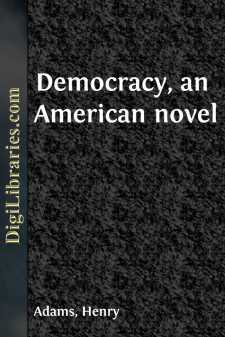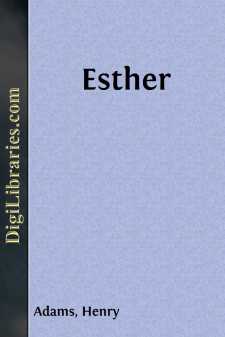Categories
- Antiques & Collectibles 13
- Architecture 36
- Art 48
- Bibles 22
- Biography & Autobiography 813
- Body, Mind & Spirit 142
- Business & Economics 28
- Children's Books 15
- Children's Fiction 12
- Computers 4
- Cooking 94
- Crafts & Hobbies 4
- Drama 346
- Education 46
- Family & Relationships 57
- Fiction 11828
- Games 19
- Gardening 17
- Health & Fitness 34
- History 1377
- House & Home 1
- Humor 147
- Juvenile Fiction 1873
- Juvenile Nonfiction 202
- Language Arts & Disciplines 88
- Law 16
- Literary Collections 686
- Literary Criticism 179
- Mathematics 13
- Medical 41
- Music 40
- Nature 179
- Non-Classifiable 1768
- Performing Arts 7
- Periodicals 1453
- Philosophy 64
- Photography 2
- Poetry 896
- Political Science 203
- Psychology 42
- Reference 154
- Religion 513
- Science 126
- Self-Help 84
- Social Science 81
- Sports & Recreation 34
- Study Aids 3
- Technology & Engineering 59
- Transportation 23
- Travel 463
- True Crime 29
Democracy, an American novel
by: Henry Adams
Description:
Excerpt
Chapter I
FOR reasons which many persons thought ridiculous, Mrs. Lightfoot Lee decided to pass the winter in Washington. She was in excellent health, but she said that the climate would do her good. In New York she had troops of friends, but she suddenly became eager to see again the very small number of those who lived on the Potomac. It was only to her closest intimates that she honestly acknowledged herself to be tortured by ennui. Since her husband's death, five years before, she had lost her taste for New York society; she had felt no interest in the price of stocks, and very little in the men who dealt in them; she had become serious. What was it all worth, this wilderness of men and women as monotonous as the brown stone houses they lived in? In her despair she had resorted to desperate measures. She had read philosophy in the original German, and the more she read, the more she was disheartened that so much culture should lead to nothing—nothing.
After talking of Herbert Spencer for an entire evening with a very literary transcendental commission-merchant, she could not see that her time had been better employed than when in former days she had passed it in flirting with a very agreeable young stock-broker; indeed, there was an evident proof to the contrary, for the flirtation might lead to something—had, in fact, led to marriage; while the philosophy could lead to nothing, unless it were perhaps to another evening of the same kind, because transcendental philosophers are mostly elderly men, usually married, and, when engaged in business, somewhat apt to be sleepy towards evening. Nevertheless Mrs. Lee did her best to turn her study to practical use. She plunged into philanthropy, visited prisons, inspected hospitals, read the literature of pauperism and crime, saturated herself with the statistics of vice, until her mind had nearly lost sight of virtue. At last it rose in rebellion against her, and she came to the limit of her strength. This path, too, seemed to lead nowhere. She declared that she had lost the sense of duty, and that, so far as concerned her, all the paupers and criminals in New York might henceforward rise in their majesty and manage every railway on the continent. Why should she care? What was the city to her? She could find nothing in it that seemed to demand salvation. What gave peculiar sanctity to numbers? Why were a million people, who all resembled each other, any way more interesting than one person? What aspiration could she help to put into the mind of this great million-armed monster that would make it worth her love or respect? Religion? A thousand powerful churches were doing their best, and she could see no chance for a new faith of which she was to be the inspired prophet. Ambition? High popular ideals? Passion for whatever is lofty and pure? The very words irritated her. Was she not herself devoured by ambition, and was she not now eating her heart out because she could find no one object worth a sacrifice?
Was it ambition—real ambition—or was it mere restlessness that made Mrs....



